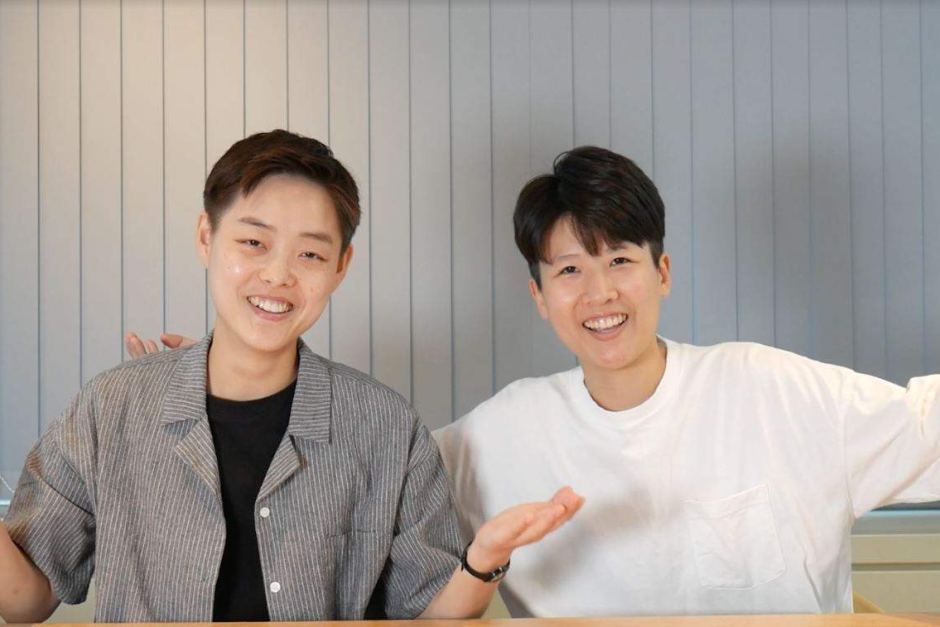No dating, no sex, no marriage and no babies: two South Korean YouTubers who vow to stay single have caused an uproar in the East Asian nation as it battles the world’s lowest fertility rate.
The duo have gained celebrity status for their SOLOdarity channel – with some 37,000 followers in its first year – where they have compared marriage to slavery for women and criticised the tradition of fathers giving away brides as offensive.
“Marriage is the root cause of patriarchy in South Korea,” said Jung Se-young, co-host of the channel’s talk show, which is popular with young women who do not want to wed and become saddled with childcare and domestic chores like their mothers.
The pair’s “No Marriage” movement has tapped into burgeoning feminism in South Korea, which saw tens of thousands of women protest in 2018 against an epidemic of voyeurism or “spycam porn” – where victims are secretly filmed urinating or mid-sex.
Deemed radical by their critics, the two women in their 30s have faced online bullying for their campaign, sometimes dubbed a “womb protest”, as women’s growing rejection of marriage and motherhood splits South Korean society.

On SOLOdarity, Jung and her co-host Baeck Ha-na, an accountant, dish out advice to women on why they should stay single, as well as touching on other feminist topics that challenge South Korean women’s traditional backseat role.
“It is about boycotting marriage, men, sex and relationships,” Jung, a teacher, told the Thomson Reuters Foundation in an interview in the capital Seoul.
Both women said their previous relationships brought them down and they had changed their appearance to please boyfriends – Jung said she even underwent minor plastic surgery.

DEMOGRAPHIC CRISIS
Marriage and childbirth are increasingly divisive topics in South Korea, where United Nations data shows the average woman has just 1.1 children, creating a demographic crisis which threatens to shrink its rapidly ageing population and economy.
To reverse this worrying trend, the government has rolled out a slew of costly measures to boost gender equality among its 51 million people, including improving parental leave policies and offering fertility treatment to couples and single women.
Single mothers are allowed to register their children using their surname under new measures to reduce the stigma often faced by unmarried women.
But traditional views about women and their sexuality are still deeply rooted in the socially conservative country, which ranked 108 out of 153 countries on the World Economic Forum’s 2020 Global Gender Gap Index.
Jung and Baeck believe marriage entrenches old-fashioned gender roles, with South Korean women spending four times longer on unpaid care – cleaning, cooking and looking after children or elderly parents – than their husbands, according to U.N. data.
“The current government’s initiatives are not designed for women – it is for men,” said Jung. “They need women who can have babies, so the policy will repeat this vicious cycle.”
Single young women are calling for greater equality in the workplace. South Korea’s gender wage gap is the highest among advanced countries at 35% in 2017 – more than double the average for the Organisation for Economic Co-operation and Development.
“With the wage gap, women feel they can’t support themselves when they get old, which is why they naturally want to find a man who they can live with and depend on,” Jung said.
Like elsewhere in Asia, the pressure to marry someone of the opposite sex to continue the family blood line is strong in South Korea but recent surveys suggest sentiment is changing.
Fewer South Korean women believe they need to marry, with the number falling to 44% in 2018 from 62% in 2008, government figures showed, while the number of people living alone rose sharply, accounting for about one-third of households.
Feminism is also gathering pace in other areas. A growing band of young women have given up makeup and cut their hair short to rebel against long-held ideals of beauty in a country with one of the highest rates of plastic surgery per capita.
‘FEMALE SUPREMACY’
On the streets of Seoul, men urged South Korean women not to spurn marriage and motherhood, despite the cost of parenting.
“It’s good to get married but it is not a must. There is a lot of financial burden that comes with marriage,” said student Kim Jae-hwan, 23, outside one of a rising number of ‘solo dining’ restaurants that have sprung up in the capital.
“Women’s rights have become an issue recently because some of them are too radical, they are not seeking gender equality but female supremacy.”
Another male student, Shin In-soo, 18, said marriage was an individual choice, but women’s rejection of it was not helping to solve South Korea’s demographic crisis.
“Considering the low birth rates and other problems in our society, it will be better for people to marry and have babies,” he said, in the Hongdae area in downtown Seoul that is famous for its student nightlife and karaoke bars.
The two YouTube stars brushed off such criticism, saying women were just reclaiming control over their lives.
“If this does affect society, then perhaps the government will look at what women really need,” said Baeck, who sports a short haircut. “The more I dated, the more I felt like I was losing a part of myself.”
Other ‘No Marriage’ supporters said they simply did not want to be treated as objects whose sole purpose was to reproduce.
“When you get married, it is like you are working for two families and you are made to feel like a baby machine,” said Baek Soo-yeon, a 29-year-old who works in a technology firm.
“It is my body, my choice.”

